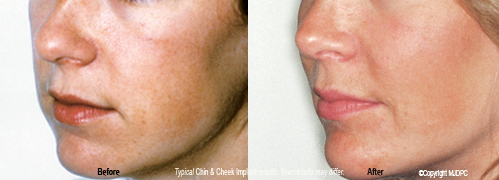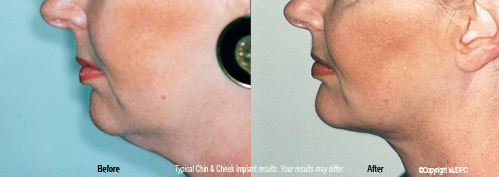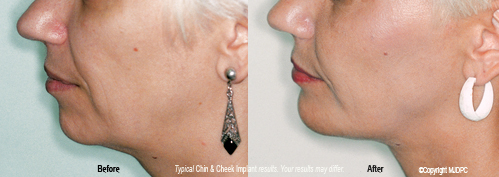Beauty may only be skin deep. But, for centuries, well-defined facial features have been considered traits of physical beauty. Prominent cheek bones and a strong chin provide balance and definition. For those seeking these natural marks of distinction, make-up was their only alternative.
Now, thanks to modern technology, there is a safe, permanent method to correct a receding chin and provide those high cheekbones sought after by men and women worldwide. Chin augmentation, or mentoplasty, and cheek implants, or malar augmentation, are performed by our doctor for patients in our region to provide a more vibrant and attractive look of distinction. These procedures can also benefit those with asymmetries or congenital defects.
Chin implants are often recommended to patients undergoing nose surgery to achieve better facial balance. In patients 38 - 50 years old, cheek implants can improve the midfacial contour and restore sagging midfacial soft tissues, thus postponing the need for a facelift. For patients receiving a facelift, cheek implants can ensure longer-lasting results.

Are chin and cheek facial implants for you?
During your initial cosmetic consultation, our physician will assess the nature of your facial structure and discuss your concerns about your face, your expectations, and explain the probable outcome of your procedure.
We may show you several before and after treatment photographs of patients having similar facial structure, and we will explain the treatment you can expect to receive. Before and after photos may be taken of your face to document your results.

Are chin and cheek implants safe?
Facial implants have proven to provide a safe, predictable, low-cost, low-risk cosmetic surgical procedure. To date, millions of facial implants made from non-toxic materials such as silicone, porous polyethylene and expanded polytetra-fluoroethylene (ePTFE) have been implanted, with no reported cases of allergic reaction.
The implants, designed specifically for use in the midfacial cheek area and the chin come in a wide variety of shapes and sizes. These implants can be custom-trimmed by your surgeon for a more natural fit.
The chin and cheek implant procedure
Both chin and cheek implantation procedures can be performed on an outpatient basis. They can be performed using general anesthesia with the patient asleep, or using a local anesthesia to numb the treated area while the patient remains awake.
After cleansing the area, your surgeon will place small incisions either in natural crease lines or inside the mouth. The implants are placed through the incision and into position. The incisions are then closed using tiny sutures.

What about insurance for chin and cheek implants?
Most health insurance does not cover procedures considered cosmetic. However, when implants are used to correct a defect, or for reconstructive purposes, they may be covered in part or in whole. It is your responsibility to check with your insurance provider for information on the degree of coverage. We will be happy to answer any questions you may have regarding payment arrangements.
If you have been wondering if having more distinctive facial features might enhance your appearance and improve your self-confidence, you should schedule a consultation with our surgeon.
How will my face feel after my chin and cheek implants are in?
After our doctor performs cheek augmentation, you can expect some discomfort, aching and some numbness along with some temporary swelling. Keeping your head elevated and applying cold compresses during the first 24 hours will help keep this to a minimum. Post-operative discomfort can be controlled with medication. Chewing food and brushing your teeth might be a little uncomfortable for a week to 10 days.
After our doctor performs chin augmentation, a dressing will be applied to cover the area for about 3 days. Post-operative discomfort can be controlled with medication. Keeping your head elevated and applying cold compresses during the first 24 hours will keep swelling to a minimum. A soft food diet may be required for a few days as chewing may be limited. All swelling should be gone within 6 weeks. External scars are minimal and will fade significantly over time. Strenuous activities should be avoided for several weeks.